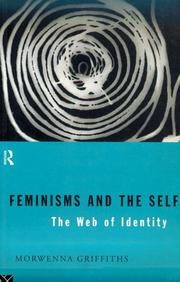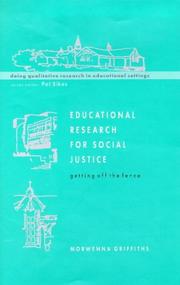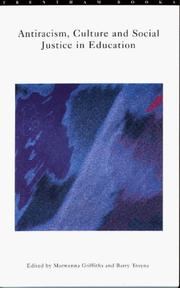| Listing 1 - 10 of 10 |
Sort by
|

ISBN: 0415098211 0415098203 Year: 1995 Publisher: London New York Routledge
Abstract | Keywords | Export | Availability | Bookmark
 Loading...
Loading...Choose an application
- Reference Manager
- EndNote
- RefWorks (Direct export to RefWorks)
Autonomie --- Autonomy --- Change --- Changement --- Feminism--Philosophy --- Feminist sociology --- Feminist theory --- Feministische theorie --- Identiteit (Psychologie) --- Identity (Psychology) --- Identité (Psychologie) --- Independence --- Personal identity --- Self-government --- Theory of feminism --- Théorie féministe --- Verandering --- Feminist theory. --- Change. --- Autonomy. --- Identity (Psychology).

ISBN: 0335198597 Year: 1998 Publisher: Milton Keynes Open university press
Abstract | Keywords | Export | Availability | Bookmark
 Loading...
Loading...Choose an application
- Reference Manager
- EndNote
- RefWorks (Direct export to RefWorks)
Educational equalization --- Education --- Social justice --- Research --- Social aspects

ISBN: 1858560373 9781858560373 Year: 1995 Publisher: Stoke-on-Trent : Trentham books,
Abstract | Keywords | Export | Availability | Bookmark
 Loading...
Loading...Choose an application
- Reference Manager
- EndNote
- RefWorks (Direct export to RefWorks)
Antirassismus. --- Aufsatzsammlung. --- Educational equalization. --- Erziehung. --- Racial attitudes. --- Racial prejudice. --- Racism. --- Social justice.
Book
ISBN: 0333413334 Year: 1988 Publisher: London Macmilan
Abstract | Keywords | Export | Availability | Bookmark
 Loading...
Loading...Choose an application
- Reference Manager
- EndNote
- RefWorks (Direct export to RefWorks)

ISBN: 0253321727 Year: 1988 Publisher: Bloomington Indiana university press
Abstract | Keywords | Export | Availability | Bookmark
 Loading...
Loading...Choose an application
- Reference Manager
- EndNote
- RefWorks (Direct export to RefWorks)
Book
Year: 1988 Publisher: Bloomington Indiana University Press
Abstract | Keywords | Export | Availability | Bookmark
 Loading...
Loading...Choose an application
- Reference Manager
- EndNote
- RefWorks (Direct export to RefWorks)
Fonds Suzan Daniel (FSD)
Book
ISBN: 1349190799 Year: 1988 Publisher: London, UK : Palgrave Macmillan,
Abstract | Keywords | Export | Availability | Bookmark
 Loading...
Loading...Choose an application
- Reference Manager
- EndNote
- RefWorks (Direct export to RefWorks)

ISBN: 1134961847 0585460523 0203204247 1280323892 9780585460529 9780203204245 0415098203 0415098211 9781280323898 9781134961849 9786610323890 6610323895 9780415098205 0415098203 9780415098212 0415098211 9781134961795 9781134961832 1134961839 Year: 1995 Publisher: London ; New York : Routledge,
Abstract | Keywords | Export | Availability | Bookmark
 Loading...
Loading...Choose an application
- Reference Manager
- EndNote
- RefWorks (Direct export to RefWorks)
What does the politics of the self mean for a politics of liberation? Morwenna Griffiths argues that mainstream philosophy, particularly the anglo-analytic tradition, needs to tackle the issues of the self, identity, autonomy and self creation. Although identity has been a central concern of feminist thought it has in the main been excluded from philosophical analysis. Feminisms and the Self is both a critique and a construction of feminist philosophy. After the powerful challenges that postmodernism and poststructuralism posed to liberation movements like feminism, Griffiths book
Feminist theory. --- Identity (Psychology) --- Change. --- Autonomy. --- Independence --- Self-government --- International law --- Political science --- Sovereignty --- Ontology --- Catastrophical, The --- Personal identity --- Personality --- Self --- Ego (Psychology) --- Individuality --- Feminism --- Feminist philosophy --- Feminist sociology --- Theory of feminism --- Philosophy
Book
ISBN: 9789401792820 940179281X 9789401792813 9401792828 Year: 2015 Publisher: Dordrecht : Springer Netherlands : Imprint: Springer,
Abstract | Keywords | Export | Availability | Bookmark
 Loading...
Loading...Choose an application
- Reference Manager
- EndNote
- RefWorks (Direct export to RefWorks)
This handbook focuses on the often neglected dimension of interpretation in educational research. It argues that all educational research is in some sense ‘interpretive’, and that understanding this issue belies some usual dualisms of thought and practice, such as the sharp dichotomy between ‘qualitative’ and ‘quantitative’ research. Interpretation extends from the very framing of the research task, through the sources which constitute the data, the process of their recording, representation and analysis, to the way in which the research is finally or provisionally presented. The thesis of the handbook is that interpretation cuts across the fields (both philosophically, organizationally and methodologically). By covering a comprehensive range of research approaches and methodologies, the handbook gives (early career) researchers what they need to know in order to decide what particular methods can offer for various educational research contexts/fields. An extensive overview includes concrete examples of different kinds of research (not limited for example to ‘teaching’ and ‘learning’ examples as present in the Anglo-Saxon tradition, but including as well what in the German Continental tradition is labelled ‘pädagogisch’, examples from child rearing and other contexts of non-formal education) with full description and explanation of why these were chosen in particular circumstances and reflection on the wisdom or otherwise of the choice – combined in each case with consideration of the role of interpretation in the process. The handbook includes examples of a large number of methods traditionally classified as qualitative, interpretive and quantitative used across the area of the study of education. Examples are drawn from across the globe, thus exemplifying the different ‘opportunities and constraints’ that educational research has to confront in different societies.
Education. --- Educational Philosophy. --- Methodology of the Social Sciences. --- Philosophy of Education. --- Philosophy of the Social Sciences. --- Education --- Social sciences --- Sciences sociales --- Philosophy. --- Methodology. --- Philosophie --- Méthodologie --- Education_xPhilosophy. --- Social sciences_xMethodology. --- Social sciences_xPhilosophy. --- Social Sciences --- Education, Special Topics --- Research --- Philosophy --- Research. --- Educational research --- Philosophy and social sciences. --- Social sciences. --- Social philosophy --- Social theory --- Education—Philosophy. --- Social sciences and philosophy --- Behavioral sciences --- Human sciences --- Sciences, Social --- Social science --- Social studies --- Civilization
Digital
ISBN: 9789401792820 9789401792837 9789401792813 9789402408058 Year: 2015 Publisher: Dordrecht Springer Netherlands
Abstract | Keywords | Export | Availability | Bookmark
 Loading...
Loading...Choose an application
- Reference Manager
- EndNote
- RefWorks (Direct export to RefWorks)
This handbook focuses on the often neglected dimension of interpretation in educational research. It argues that all educational research is in some sense ‘interpretive’, and that understanding this issue belies some usual dualisms of thought and practice, such as the sharp dichotomy between ‘qualitative’ and ‘quantitative’ research. Interpretation extends from the very framing of the research task, through the sources which constitute the data, the process of their recording, representation and analysis, to the way in which the research is finally or provisionally presented. The thesis of the handbook is that interpretation cuts across the fields (both philosophically, organizationally and methodologically). By covering a comprehensive range of research approaches and methodologies, the handbook gives (early career) researchers what they need to know in order to decide what particular methods can offer for various educational research contexts/fields. An extensive overview includes concrete examples of different kinds of research (not limited for example to ‘teaching’ and ‘learning’ examples as present in the Anglo-Saxon tradition, but including as well what in the German Continental tradition is labelled ‘pädagogisch’, examples from child rearing and other contexts of non-formal education) with full description and explanation of why these were chosen in particular circumstances and reflection on the wisdom or otherwise of the choice – combined in each case with consideration of the role of interpretation in the process. The handbook includes examples of a large number of methods traditionally classified as qualitative, interpretive and quantitative used across the area of the study of education. Examples are drawn from across the globe, thus exemplifying the different ‘opportunities and constraints’ that educational research has to confront in different societies.
Philosophy --- Philosophy and psychology of culture --- Social sciences (general) --- Sociology --- Teaching --- Educational sciences --- onderwijsfilosofie --- psychosociale wetenschappen --- sociologie --- sociale filosofie --- sociale wetenschappen --- methodologieën
| Listing 1 - 10 of 10 |
Sort by
|

 Search
Search Feedback
Feedback About UniCat
About UniCat  Help
Help News
News